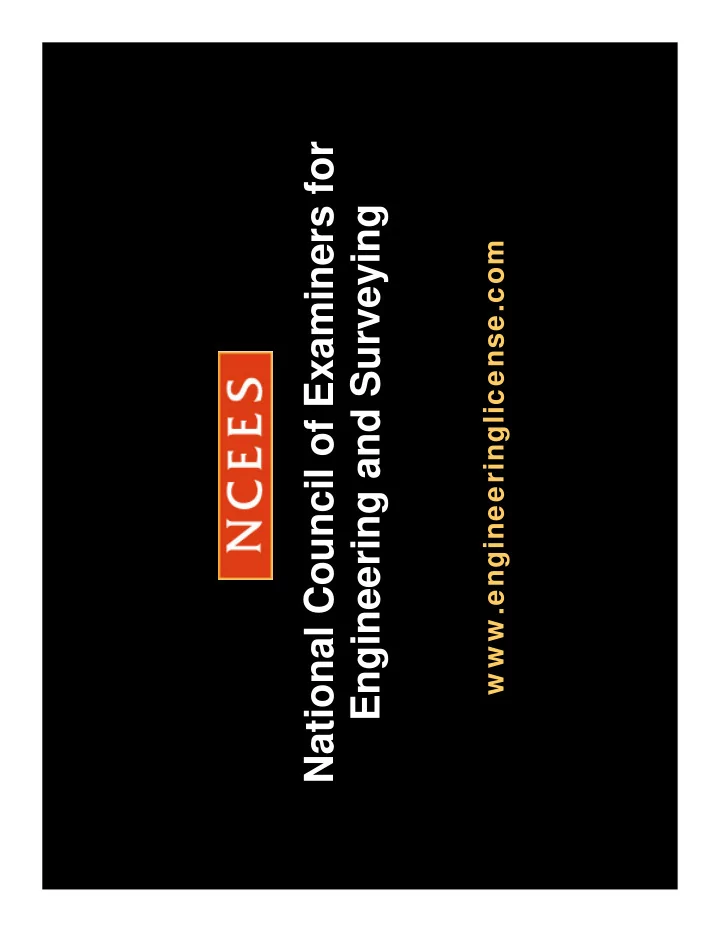

National Council of Examiners for Engineering and Surveying w w w .engineeringlicense.com
Engineering Licensure A Path of Opportunity
What is Licensure? Why Bother? Steps to Licensure FE Exam PE Exam
What is Licensure?
To You Why is it Important? To the Public
Why Bother
Steps to Licensure
Graduate from an ABET-accredited Engineering Program
Pass the Fundamentals of Engineering Exam (FE)
Acquire Engineering Experience with Increasing Levels of Responsibility with Supervision of a Licensed Engineer
Pass the Principles & Practice of Engineering Exam (PE)
Your Name, P.E. Enjoy the Benefits of a Professional Engineering License
Pass the Fundamentals of Engineering Exam (FE)
What is the test like? When should I take it? How do I prepare?
TEST FORMAT
8-Hour Closed-Book Exam 2 Sessions (Morning & Afternoon) FE Examination
Engineering Economics Electricity & Magnetism 120 Chemistry Ethics Questions Engineering Statistics Fluid Mechanics Strength of Materials Morning Session Thermodynamics Mathematics Statics & Dynamics Computers Material Properties FE Examination
Disciplines - Chemical 60 - Civil - Electrical Questions - Industrial - Mechanical - Environmental Afternoon Session General - Designed for all other disciplines FE Examination
- Chemistry - Material / Energy Balance Chemical Module - Thermodynamics - Fluid Dynamics - Heat Transfer - Mass Transfer - Chemical Reaction Engr. - Process Design - Computer Usage - Process Control - Safety FE Examination
- Construction Management - Environmental Engineering Civil Module - Hydraulics & Hydrologic Systems - Soil Mechanics & Foundations - Structural Analysis - Structural Design - Surveying - Transportation - Materials FE Examination
- Circuits - Power Electrical Module - Electromagnetics - Control Systems - Communications - Signal Processing - Electronics - Digital Systems - Computer Systems FE Examination
- Water Resources Environmental Module - Water and Wastewater - Air Quality - Solid and Hazardous Waste - Environmental Science and Management FE Examination
- Mechanical Design - Kinematics and Dynamics Mechanical Module - Materials Processing - Measurements, Controls - Thermodynamics and Energy Conversion - Fluid Mechanics - Heat Transfer - HVAC and Refrigeration FE Examination
- Engineering Economics Industrial Module FE Examination
- Advanced Engineering Math General - Probability and Statistics Module - Biology - Economics - Applied Engineering Mechanics - Engineering of Materials - Fluids - Electricity and Magnetism - Thermodynamics & Heat Transfer FE Examination
WHEN
90% 80% 70% 60% Percent Passing 50% Currently Enrolled 40% Graduate 30% 20% 10% 0% Civil Electrical Mechanical Total Major
PREPARATION
Ways to Prepare • You are preparing yourself while taking senior level courses • Be familiar with the Supplied Reference Handbook – note there is a new handbook, 8 th Edition • Select your afternoon module wisely – review the specifications • Review courses / Work sample questions
Myths and Truths • The exam is scaled meaning the difficulty of your exam is taken into account in scoring • You do not have to get 70% of the questions correct • General is not easier but it is not harder either • There is no set passing percentage - theoretically, everyone that takes the exam can pass – conversely, everyone could fail
Myths and Truths • It does not matter where you get your points • You are not penalized for guessing • The exam will use mostly SI units but in some cases you may have US Customary units • You have, on average, 2 minutes per AM question and 4 minutes per PM question • Examinee Comment Forms
Myths and Truths • Calculators are a big deal. You can only used one of the models on the acceptable list, see www.ncees.org • It must be exactly as listed, else you will not be able to use it or you could be asked to leave the exam room
Myths and Truths • No cell phones – this is a big deal as well • Don’t be late – once the doors are closed you will not be admitted • If you have questions about exam administration – contact the Board or the testing service.
Pass the Principles & Practice of Engineering Exam (PE)
8-Hour Open-Book Exam Morning & Afternoon Sessions 80 - 100 Questions Offered tw ice a year No-choice OR Breadth and Depth Format PE Examination
PE Exams • Mechanical • Civil • Metallurgical • Agricultural • Architectural • Mining and Mineral • Chemical • Naval Architecture & Marine Engineering • Control Systems • Nuclear • Electrical • Petroleum • Environmental • Structural • Fire Protection • Industrial PE Examination
Civil Breadth & Depth (All Objective format – effective April 2008) Morning Session – Breadth Module Afternoon Session - Depth Module Structural Construction Transportation Geotechnical Environmental / Water Resources Civil PE Examination
Environmental • Water - wastewater, storm water, resources • Air – emission sources, control strategies • Solid and Hazardous Waste – municipal, commercial, radioactive, special • Environmental Assessments – remediation, public health, industrial hygiene Environmental PE Examination
Now that I have my P.E. Periodic Renew al Continuing Education Mobility Betw een Jurisdictions NCEES Records Program
NCEES Records Program � Designed to help simplify and expedite licensure by comity � Open to any currently licensed individual � Electronically retrieved by licensing boards
National Council of Examiners for Engineering and Surveying w w w .engineeringlicense.com
Recommend
More recommend